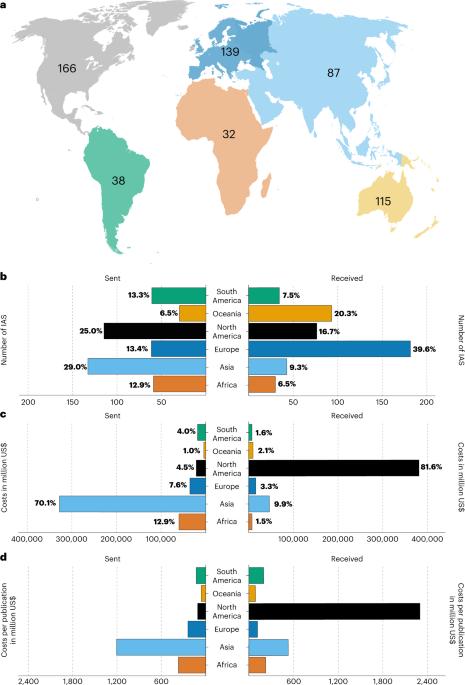Unevenly distributed biological invasion costs among origin and recipient regions
IF 25.7
1区 环境科学与生态学
Q1 ENVIRONMENTAL SCIENCES
引用次数: 4
Abstract
Globalization challenges sustainability by intensifying the ecological and economic impacts of biological invasions. These impacts may be unevenly distributed worldwide, with costs disproportionately incurred by a few regions. We identify economic cost distributions of invasions among origin and recipient countries and continents, and determine socio-economic and biodiversity-related predictors of cost dynamics. Using data filtered from the InvaCost database, which inevitably includes geographic biases in cost reporting, we found that recorded costly invasive alien species have originated from almost all regions, most frequently causing impacts to Europe. In terms of cost magnitude, reported monetary costs predominantly resulted from species with origins in Asia impacting North America. High reported cost linkages (flows) between species’ native countries and their invaded countries were related to proxies of shared environments and shared trade history. This pattern can be partly attributed to the legacy of colonial expansion and trade patterns. The characterization of ‘sender’ and ‘receiver’ regions of invasive alien species and their associated cost can contribute to more sustainable economies and societies while protecting biodiversity by informing biosecurity planning and the prioritization of control efforts across invasion routes. The impacts of biological invasions may be unevenly distributed globally, with a few regions bearing most of the cost. This study identifies cost distributions of invasions among origin and recipient countries and continents, and determines socio-economic and environmental predictors of cost dynamics.

生物入侵成本在来源国和接受国之间分布不均
全球化加剧了生物入侵对生态和经济的影响,从而对可持续性提出了挑战。这些影响可能在全球范围内分布不均,少数地区的成本过高。我们确定了入侵在原产国和接受国以及各大洲之间的经济成本分布,并确定了成本动态的社会经济和生物多样性相关预测因素。利用从 InvaCost 数据库中筛选出的数据(该数据库不可避免地包含了成本报告中的地理偏差),我们发现,记录在案的高成本外来入侵物种几乎来自所有地区,其中对欧洲造成的影响最为常见。就成本规模而言,报告的货币成本主要来自于影响北美的亚洲物种。据报告,物种的原产国和被入侵国之间的高成本联系(流量)与共同环境和共同贸易历史有关。这种模式可部分归因于殖民扩张和贸易模式的遗留影响。外来入侵物种的 "发送者 "和 "接收者 "地区的特征及其相关成本可以为生物安全规划提供信息,并确定入侵路线上控制工作的优先次序,从而在保护生物多样性的同时,促进经济和社会的可持续发展。生物入侵的影响可能在全球范围内分布不均,少数地区承担了大部分成本。本研究确定了入侵成本在原产国和接受国以及各大洲之间的分布情况,并确定了成本动态的社会经济和环境预测因素。
本文章由计算机程序翻译,如有差异,请以英文原文为准。
求助全文
约1分钟内获得全文
求助全文
来源期刊

Nature Sustainability
Energy-Renewable Energy, Sustainability and the Environment
CiteScore
41.90
自引率
1.10%
发文量
159
期刊介绍:
Nature Sustainability aims to facilitate cross-disciplinary dialogues and bring together research fields that contribute to understanding how we organize our lives in a finite world and the impacts of our actions.
Nature Sustainability will not only publish fundamental research but also significant investigations into policies and solutions for ensuring human well-being now and in the future.Its ultimate goal is to address the greatest challenges of our time.
 求助内容:
求助内容: 应助结果提醒方式:
应助结果提醒方式:


